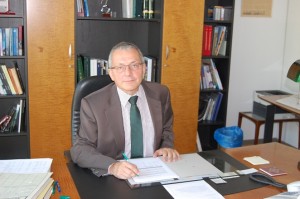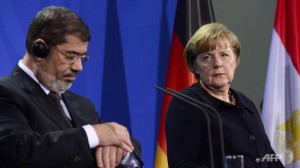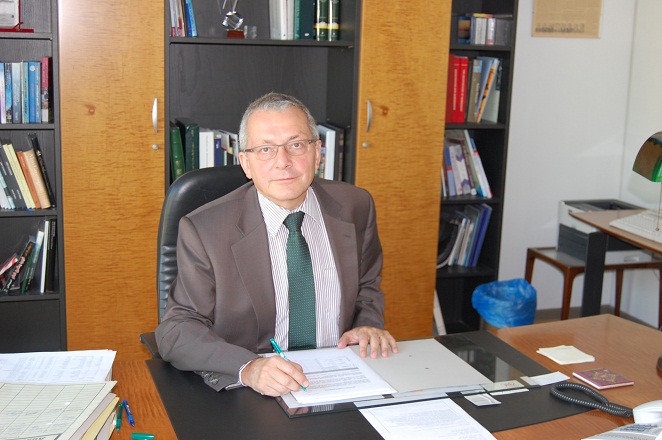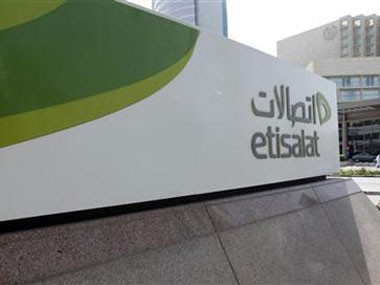
Joel Gulhane
Following President Mohamed Morsi’s recent visit to Berlin, it was reported that €240m of debt relief promised to Egypt by Germany would be postponed.
When asked why the debt relief was postponed, Germany’s development minister Dirk Niebel cited Egypt’s political instability, going as far as comparing Morsi’s presidency to the regime which was toppled by the January 2011 Revolution: “There is a risk that the dictatorial system of the deposed President [Hosni] Mubarak is revived, only this time with other people.”
Germany was one of the first countries to pledge its support to the Egyptian people during the 25 January Revolution and has been involved in providing support for the on-going democratic transition.
Germany is also heavily involved in development projects in Egypt. The current social unrest in Egypt, as made evident by Niebel’s statements, appears to be threatening this relationship.
Daily News Egypt sat down with the German Ambassador to Egypt Michael Bock, to clarify the situation on German aid to Egypt, to discuss the on-going transition and take a look at some German initiatives to support the process.
Firstly we wanted to know more about you, what brought you to Egypt, How long have you been in Egypt and are you enjoying your time here?
I am still enjoying it because I love the Egyptian people, I love their culture and I admire their way of dealing with the obstacles of life. I think everybody abroad can learn a lot from them. I have been here for three years now and I am still learning every day. I am proud to be here at this historic moment which started two years ago and is not over yet. I think this process of transition will take many more years before Egypt has crossed these troubled waters.
You have seen first-hand the on-going transformation that Egypt is experiencing. What is your opinion of the transformation to democracy?
I have a mixed commentary to give you. I think it is quite difficult for a country after decades of military dictatorship to start democracy in a country with about 40-50% illiteracy rate and many people living in poor conditions; this takes time to develop. On the other hand, I do not belong to the group that says Egypt is not made for democracy due to these arguments. That’s nonsense. Democracy is learning by doing and I think within these two years the Egyptians have made a lot of progress.
I must say that much time has been lost over the last two years; not as far as building up democratic structures is concerned, but simply the economic issue and the social issues. A lot of money has been wasted over these two years instead of taking the right decisions, meanwhile Egypt is close to bankruptcy and it is much more difficult now to take the right steps than it was two years ago. I have gotten very angry in the past hearing “no, we are only a transitory government, we cannot decide anything.” That is a pity, but I hope the country begins to take these right steps now.
In 2011 the Egyptian foreign minister went to Berlin and met with his counterpart and they produced the Berlin Declaration. The contents of the declaration seem to show Germany has a lot of support to give Egypt for this democratic transition. Could you tell me more about the support that Germany has provided and is intending to provide?
We can talk about development aid, scientific cooperation, all our bilateral projects in the educational field, and the economy, and I think all these aspects are crucial because democracy is not a simple thing to be realised. Democracy is a concept with many aspects and it is obvious that without economic progress it is much more difficult to build up a democratic country than with a vibrant economy.
We need economic and political progress, we need education, we need all of it and Germany is one foreign country amongst many that has offered its help. However it is quite clear that this democratic transformation cannot and will not be made from abroad. We have to avoid one big misunderstanding. Democracy cannot be imported from abroad; it must come from the roots of this country, the population itself. Foreigners can only assist, give advice or push here or there a little bit, but they can only do it if our help is wanted and if the development itself is wanted.
I wanted to talk about the German aid to Egypt, as there are a few sections in this topic including €240m pledged in the Berlin Declaration as well as development and military aid. First, there have been reports that the debt relief would be postponed. Could you clarify what the situation is with the debt relief?
Debt relief doesn’t mean that a country simply doesn’t have to give back the money it owes. Debt relief in this sense is an agreement on additional projects that are realised by the host country and for which the money the country owes can be taken. So instead of paying back the €240m, Egypt converts the money into local currency and thus internal development projects in cooperation with us. So the idea is that Egypt defines certain projects and says here and there we want to step forward.
Out of the €240m a chunk of €80m has been taken so far. We try to assign certain projects to this €80m. €50m have already been clearly assigned with the remaining €30m waiting to be designated. I am confident that within the next few weeks we will make the necessary agreements with Egypt’s Ministry of International Cooperation to finish the €80m. And as soon as this has happened we will address the remaining €160m. To clarify, only the €80m portion of the debt was due to be paid back now.
In December the German development minister made comments to a German newspaper saying that development aid will be cut until Egypt displays a more positive transformation to democracy. He expressed concern that Egypt may be falling back in to an authoritarian cycle.
I have not been present for this and I do not know what he really said but I know that the reports about what he said are wrong. We follow on with our development cooperation as we have done in the past with one difference; we augmented the money available tremendously.
When I started three and a half years ago we were at about €150m in bilateral aid over a two-year period and our latest commitment from the end of 2012 is around €350m over a two-year period. We have more than doubled aid to Egypt within about three years.
On military aid, there is no such thing like the United States gives to Egypt. We do not give military assistance.
I want to move on to an interesting initiative, the Tahrir Lounges. There are two sites at the moment, one in Cairo and one in the Nile Delta region. Could you tell me more about this initiative, and how the Egyptian public uses these lounges?
These initiatives, firstly, the site next to Tahrir Square in the rooms of the Goethe Institute, were an initiative of the first hour of the revolution. This is important because then you easily understand what it was meant to be. We had a lot of people meeting in Tahrir and a lot of interest in change of the society.
We had a lot of youth who wanted to meet, debate, discuss and have a forum. There was no place like this. They were convening in the open air around Tahrir and had their debate. So we decided to offer them a forum to do so; they could come to the Goethe institute, sit down, have coffee and use the computers.
They could discuss and tell others what they wanted to change in this country and I think it is quite important to know that this lounge was open to everybody. Don’t think there were no Muslim Brotherhood members admitted or others. Whoever had something to say could go there.
As a next step we had to bring a bit of order to this spontaneous development. Mona Shaheen has a lot of contacts with all the groups involved and she is structuring it and the process is going on and on. It is a broad variety of activities being realised.
After the lounge started near Tahrir, soon afterwards we opened a second in the delta which follows the same concept, which in a way is more interesting than the lounge in Tahrir. In Cairo you can still find other locations if you need to, whereas in the delta there is nothing like this. So engaging young people who want to express their opinions and are looking for a way to contribute in shaping the future of Egypt, they need this forum to express themselves and find a common platform.
Are there plans to build more Tahrir Lounges?
There are more initiatives to build Tahrir Lounges but we have not received the necessary permit yet. All this involves a lot of bureaucracy, not to mention this is a national activity in the broader context of the NGO movement. The authorities want to know what it going on and are asking about the involvement of foreigners.
Regarding NGOs, there are proposed laws to govern them, which would prevent Egyptian NGOs from seeking help from abroad without prior permission from the government. Germany has a lot of influence in development in Egypt and around the world. What is your view on this?
I must say I am also concerned. The situation is not clear to me, and there are many drafts now. We don’t know which one will come into law. They all have one thing in common; they are quite restrictive of the freedom to act.
The common denominator is that the state wants to control what is going on in the NGO scene, and I am not talking about foreign NGOs, which is a different issue. I am talking about Egyptian NGOs. I ask myself what is really true because we are getting contradicting signals.
The drafts are very regulatory; they want to bring everything under state control whereas on the other hand the political leaders in Egypt say a free NGO environment is important for the development of the society, so everybody should be free to become active in this field.
This contradiction has to be dissolved. We are watching this closely and I know within the NGO community there is a lot of preoccupation. I can only hope now that nothing happens in the field of legalisation and pushing through these drafts. It would be better to take a fresh look.
Freedom was one of the main demands of the 25 January revolution. How do you see the status of political and social freedom in Egypt under President Mohamed Morsi, have they progressed or remained the same?
I think Egypt is going forward in general, unfortunately a bit too slowly and there have been some setbacks, which is normal in such a climate of change. Take one point, freedom of the media. Although there is a lot of criticism, I think the situation is much better than it was under Mubarak. I do not want to go in to too much detail as I am a representative of foreign country and these are internal affairs of Egypt and must be sorted out by Egypt itself.
President Morsi was invited by Chancellor Angel Merkil to visit Germy recently. During the visit, the chancellor asked him to display more democratic principles in the future. Could you clarify what the chancellor is looking for?
I think that was a double message. First, we, like other countries, are taking a close look at issues such as freedom of religion, human rights and the particularly important principle of inclusiveness concerning the whole of Egyptian society. This is not only formed by the layer that wants political Islam in power; there are also liberals and others that form part of this society. Chancellor Merkel’s message was that a democratic Egypt could only be built up if all these layers are represented within the leadership of this country.

AFP Photo /John Macdougall
The other part of the message was Germany’s commitment to help Egypt to build for the future. There was no conditionality. This is not the way politicians deal with each other, but I think the message was quite clear, underlining the legitimacy of this leadership and giving advice on how to deal with the very difficult situation in Egypt.
This is not an everyday issue in legislation where the majority decides on a law and that’s it, and the opposition is not happy but can live with is. This is about the social contract of the whole country, and therefore it is important that everybody feels integrated and represented. It is not only the task of a president to do this, but also of everybody who is active in the political scene. However, since he is the president it is his primary task.
Parliamentary elections are coming up and this is part of a much bigger picture. In your opinion what is the best way for Egypt to move forward in its transition to democracy?
One aspect you mentioned is the elections and the framework of the organisation of a state. I think this is on its way. What is becoming more important now is the economy. I already mentioned that much time has been lost and Egypt has to stop the acceleration of its negative spiral. In order to do this some decisions must be made.
What we heard over the weekend gives us some hope that now some stringent economic policy will be adopted. We cannot wait for months until a new parliament takes over. What we need are decisive steps now, and part of this is broadening the tax basis. I get the impression that not many people pay taxes in this country, apart from indirect taxes.
Everybody must contribute. This refers to the richer section of society and the middle class. It is obvious that the poor cannot contribute to this because they are near zero anyway, and one of the major tasks will be how to reduce subsidies without affecting this layer of society.
I think here the international community can offer some help. This is not only about money, this is about how to organise the reshaping of policies. I think Egypt has to go this direction, and as soon as these first steps are taken, confidence has a chance of being rebuilt and then the outflow of capital might stop, attracting more investors.
As soon as we have more security on the streets, the tourism sector could start booming again and so on. We are at a crucial moment now. The leadership in Egypt must try to change the whole environment because there is no other chance. This country has all the fundamental conditions to become successful; it is just in a moment in history that is so critical.



